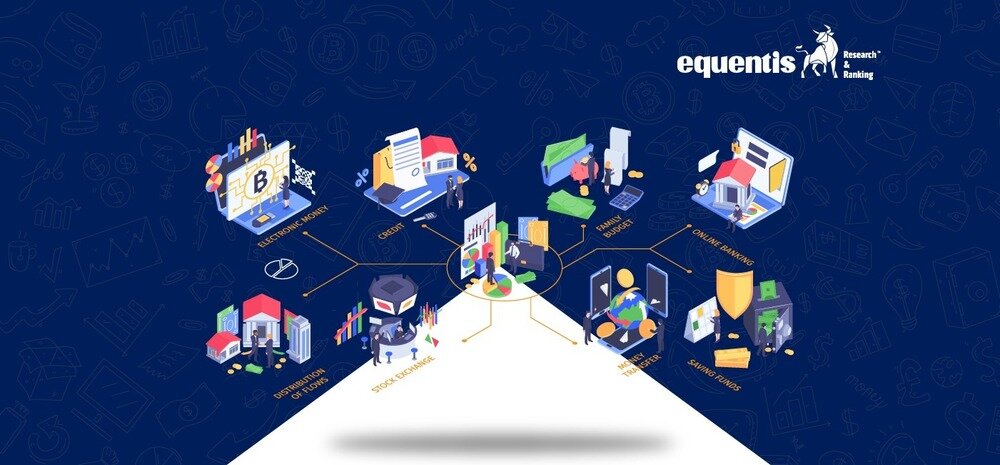Introduction:
As the economic landscape kept evolving worldwide, finance became fintech, eventually leading to the currently emerging technology- blockchain. Blockchain was initially designed to support the implementation of Bitcoin, the pioneering cryptocurrency.
Over time, the use of blockchain in finance has expanded beyond its use in supporting Bitcoin, and it is now being widely utilized in various fields, particularly in finance.
But what exactly are the applications of blockchain in finance? And what is the future of fintech with blockchain in finance? Let’s start understanding with some definitions.
What is blockchain technology in finance?
Blockchain in finance is a secure and transparent digital ledger that records and verifies transactions. Each block in the chain contains a different batch of transactions and links to the previous block using cryptographic hashing.
(Image source- Link)
Each block includes the previous block’s hash value, ensuring that any tampering with a transaction compromises the entire blockchain’s integrity. Several such blocks form an unchangeable and transparent chain. Thus, each digital asset, currency, or token has its blockchain.
You can imagine this as a Google sheet that everyone can view. But the catch here is ‘encryption’. The code that makes the spreadsheet work is encrypted. So, anyone can view a blockchain, but to make any valid edits (usually to record a transaction), you need the exact code (or key) and must make a valid change. This makes blockchains almost impossible to hack.
Blockchain architecture has three main components:
- Distributed Ledger:
Blockchain as a distributed ledger is a shared database in the blockchain network that stores transactions. It’s like a shared file that everyone on the team can edit.
- Smart Contracts:
Smart contracts allow companies to manage business contracts without third-party assistance. They are programs stored on the blockchain that run automatically when certain conditions are met. For instance, a logistics company might use a smart contract to release payment once goods arrive at the port automatically.
- Public Key Cryptography:
Public key cryptography ensures security and identity verification in the blockchain network. It generates two keys for each participant: a public key, common to everyone, and a private key, unique to each member. These keys work together to unlock data in the ledger. For example, your friend, Jill, records a transaction with his private key. You can decrypt it with your public key, ensuring the transaction is genuinely from Jill. But if Jill’s private key were tampered with, your public key wouldn’t work.
Application of blockchain in finance:
Fintech and blockchain technology are gaining popularity in India, with many companies aiming to revolutionize the financial sector. The application and benefits of blockchain in finance are plenty. Currently, blockchain in finance is enhancing several vital areas of the financial industry, including the following-
- Payment settlements:
Some payments can take up to a week to settle in the system. This happens because multiple intermediaries are involved. Each transaction has to go through several layers, like the front and back offices of banks or third parties such as currency exchangers for cross-border payments. These lead to delays and increased costs.
Blockchain in finance offers a solution by enabling peer-to-peer (P2P) transactions. This means we can eliminate intermediaries since smart contracts can handle transactions directly. With fewer layers in the system, one can settle payments instantly. Plus, blockchain payment systems can make cross-border payments happen right away, too. So, using blockchain in finance can lead to instant settlements.
- Robust identity verification:
With blockchain in finance, identity verification becomes more secure, efficient, and convenient. First, blockchain stores identity details on a decentralized ledger, making it safer from hacking and data breaches. Second, it allows for self-sovereign identity, meaning you have complete control over sharing your information. Once data is recorded on the blockchain, it can’t be tampered with, ensuring data accuracy and reliability. This significantly reduces fraud risks like identity theft.
Real-world applications include Estonia’s e-Residency program, which uses blockchain for secure remote business transactions, and Microsoft’s ION, a decentralized identity platform on the Bitcoin blockchain.
- Blockchain in Finance for Asset Management:
Today, venture capital firms, private equity firms, firms managing HNI investments, real estate funds, and specialty markets face challenges like better-managing liability risks, adapting decision-making processes, and navigating complex regulations. Blockchain offers solutions to streamline these issues. It can automate fund launches, enhance stakeholder engagement through digitized assets, and expand market access for portfolios and holdings. How exactly?
- Privacy settings are customizable to ensure transaction confidentiality, while voting rights and shareholder obligations are embedded in digital assets, minimizing errors and improving user experience.
- Blockchain also introduces incentive mechanisms to encourage participation and deter misconduct, enhancing governance and transparency for investors.
- Fund administration and asset transfer agency processes are automated, reducing operational complexities.
- Blockchain in finance for regulatory compliance:
Keeping up with regulatory changes is a significant challenge, especially for international firms. Blockchain provides:
- Unique governance and compliance features embedded in digital assets.
- Automated processes for data verification, reporting, and regulatory oversight, reducing operational issues and errors.
- Real-time capabilities to streamline auditing and other activities.
- Create and enforce incentive structures to enhance network governance.
- Blockchain in finance for smart contract:
Blockchain’s most impactful use in finance is its ability to establish trust efficiently through smart contracts. These digital agreements are ideal for scenarios where precise outcomes are crucial, such as investment agreements. Here, contracts automatically execute once the blockchain network verifies all predetermined conditions, ensuring compliance with terms like funding thresholds and share allocations.
Smart contracts are in high demand across various sectors given their efficiency and security benefits. Companies like Aditya Birla Health Insurance have adopted blockchain-based smart contracts to settle claims in near real-time and streamline operations.
- Blockchain in finance for trade financing:
In traditional stock markets, transactions involve multiple parties, such as investors, brokers, and regulators, causing delays of up to three days due to communication gaps. However, with blockchain’s smart contracts, investments can be executed instantly, bypassing the usual delays.
This peer-to-peer approach allows direct investments, skipping intermediaries and speeding up the entire process. Additionally, blockchain in finance has introduced a new way to raise capital: initial coin offerings (ICOs).
Unlike traditional Initial Public Offerings (IPOs), ICOs offer digital tokens representing ownership in a company, attracting companies for their speed, safety, and accuracy in capital collection. In India, Drivezy successfully raised capital through ICO in 2018.
- Blockchain in finance as NFT:
Blockchain in finance added cryptocurrency as a new asset class in the capital market. NFT is another such tool. What is NFT? Non-fungible tokens (NFTs) represent unique assets like art or digital content, serving as digital certificates of ownership and authenticity. NFTs are gaining traction due to their liquidity and potential for growth, attracting more participants eager to buy or sell unique items. They’ve significantly impacted crypto and are expected to integrate with other blockchain applications, potentially reshaping financial systems. One immediate association you can make with NFTs is their connection to decentralized finance (DeFi), a blockchain-based financial system to reduce reliance on traditional banks.
The road ahead for blockchain in Finance:
Blockchain technology is poised to revolutionize digital payments and finance. Here’s what you can expect:
- Mainstream Adoption: More banks, governments, and businesses are embracing blockchain. With easier usability and clearer regulations, adoption will speed up.
- Central Bank Digital Currencies (CBDCs): Governments worldwide are exploring CBDCs, digital versions of their currencies on blockchain. These could transform payment systems and offer governments better financial insights.
- Interoperability and Collaboration: With numerous blockchain projects emerging, seamless transactions across platforms will be vital. The collaboration will build a unified global financial network.
Conclusion:
Blockchain technology offers numerous benefits in financial services and is poised to transform the industry. According to KPMG, it can slash errors by up to 95%, boost efficiency by 40%, and cut capital consumption by 75%. This transformative potential extends across various sectors within finance. From enhancing payment systems to modernizing regulatory compliance, blockchain promises efficiency, security, and transparency. Moreover, its adoption could foster financial inclusion and spur economic growth, benefiting businesses and individuals. As blockchain gains traction, its impact on the financial services landscape is set to endure, reshaping traditional models and practices for years to come. Though it hasn’t completely replaced conventional financial advisory services, it has improved it to a great extent.
*Disclaimer Note: The securities quoted, if any, are for illustration only and are not recommendatory. This article is for education purposes only and shall not be considered as recommendation or investment advice by Research & Ranking. We will not be liable for any losses that may occur. Investment in securities market are subject to market risks. Read all the related documents carefully before investing. Registration granted by SEBI, membership of BASL, and certification from NISM in no way guarantee the performance of the intermediary or provide any assurance of returns to investors.
FAQs on Blockchain in Finance
How is blockchain being used in finance?
The application of blockchain in finance started with the rise of the cryptocurrency market. Eventually, blockchain technology was used in risk management, cross-border payments, securing banking procedures, and trade financing.
What is blockchain in fintech?
Blockchain and fintech have a close relationship in two main ways. First, blockchain is important in online cryptocurrency transactions like Bitcoin and Ethereum purchases. Any fintech platform dealing with cryptocurrencies must utilize blockchain technology. Second, blockchain offers a promising path for improving traditional financial operations. It enhances security, efficiency, and trust through its decentralized and transparent nature, making it a transformative force in fintech.
What is blockchain in finance transformation?
The use of blockchain in finance has transformed the fintech landscape everywhere. The way transactions are settled, the newly emerging asset class like cryptocurrency, and even wealth management, every aspect is eventually coming under the purview of blockchain technology lead transformation.
How useful was this post?
Click on a star to rate it!
Average rating 5 / 5. Vote count: 1
No votes so far! Be the first to rate this post.
I’m Archana R. Chettiar, an experienced content creator with
an affinity for writing on personal finance and other financial content. I
love to write on equity investing, retirement, managing money, and more.
























